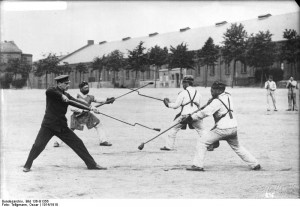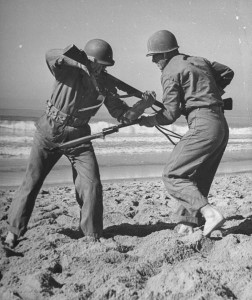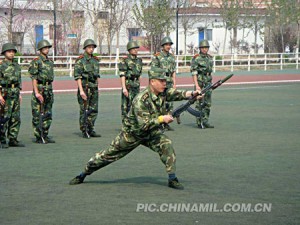More Humiliation
/ I just finished reading Paul A. Cohen's book, History in Three Keys, The Boxers as Event, Experience, and Myth. Expect a positive review in the next week. I mention it now because some quotes from the book are included in the review below.
I just finished reading Paul A. Cohen's book, History in Three Keys, The Boxers as Event, Experience, and Myth. Expect a positive review in the next week. I mention it now because some quotes from the book are included in the review below.I bought a copy of, The Xingyi Quan of the Chinese Army, Huang Bo Nien's Xingyi Fist and Weapon Instruction, by Dennis Rovere, with translation by Chow Hon Huen. It's published by Blue Snake Books, Berkeley, California. It's a waste of money. I bought it because Dojo Rat gave it a positive review. I realize now that he gave it a positive review because he thought it might be of interest to those of us who like history. Well--I'll be damned--I'm going to get my money's worth by having some fun reviewing it!
 The book is a translation of a short manual about Xingyi training from the 1920's, supposedly used by Chang Kai-sheik's army and the KMT. It would have been a pamphlet except that Dennis Rovere added a lot of his own useless material, explanations and pictures. With the exception of a section on Bayonet Fighting, which we will address shortly, the original manual is nearly identical to material already published in nearly every Xingyi book. Take for example this translation by John Groschwitz, The Xingyi Boxing Manual. This kind of manual is meant to be memorized and contemplated, but every single detail needs to be taught and digested over years. They all read like a teacher's lecture notes. (That's OK, I guess, but did we need another one?)
The book is a translation of a short manual about Xingyi training from the 1920's, supposedly used by Chang Kai-sheik's army and the KMT. It would have been a pamphlet except that Dennis Rovere added a lot of his own useless material, explanations and pictures. With the exception of a section on Bayonet Fighting, which we will address shortly, the original manual is nearly identical to material already published in nearly every Xingyi book. Take for example this translation by John Groschwitz, The Xingyi Boxing Manual. This kind of manual is meant to be memorized and contemplated, but every single detail needs to be taught and digested over years. They all read like a teacher's lecture notes. (That's OK, I guess, but did we need another one?)Why was the manual published in the first place? Dennis Rovere doesn't seem to know. The answer is that it was a salvo in a political debate of the 1920's. Take for instance this satirical note by Lu Xun (probably the best known intellectual of the "New Culture" movement) comparing Kungfu guys to the Boxer Uprising, published in New Youth, 1918:
Recently, there have been a fair number of people scattered about who have been energetically promoting boxing [quan]. I seem to recall this having happened once before. But at that time the promoters were the Manchu court and high officials, where as now they are Republican educators--people occupying a quite different place in society. I have no way of telling, as an outsider, whether their goals are the same or different.
These educators have now renamed the old methods "that the Goddess of the Ninth Heaven transmitted to the Yellow Emperor"..."the new martial arts" or "Chinese-style gymnastics" and they make young people practice them. I've heard there are a lot of benefits to be had from them. Two of the more important may be listed here:
(1) They have a physical education function. It's said that when Chinese take instruction in foreign gymnastics it isn't effective; the only thing that works for them is native-style gymnastics (that is, boxing). I would have thought that if one spread one's arms and legs apart and picked up a foreign bronze hammer or wooden club in one's hands, it ought probably to have some "efficacy" as far as one's muscular development was concerned. But it turns out this isn't so! Naturally, therefore, the only course left to them is to switch to learning such tricks as "Wu Song disengaging himself from his manacles." No doubt this is because Chinese are different from foreigners physiologically.
(2) They have a military function. The Chinese know how to box; the foreigners don't know how to box. So if one day the two meet and start fighting it goes without saying the Chinese will win.... The only thing is that nowadays people always use firearms when they fight. Although China "had firearms too in ancient times" it doesn't have them any more. So if the Chinese don't learn the military art of using rattan shields, how can they protect themselves against firearms? I think--since they don't elaborate on this, this reflects "my own very limited and shallow understanding"--I think that if they keep at it with their boxing they are bound to reach a point where they become "invulnerable to firearms." (I presume by doing exercises to benefit their internal organs?) Boxing was tried once before--in 1900. Unfortunately on that occasion its reputation may be considered to have suffered a decisive setback. We'll see how it fares this time around. (This is from p. 230-231 of Paul A. Cohen's, History in Three Keys.)
 The introduction of Rovere's book claims that the famous martial artist's Sun Lutang and Wang Xiangzhai both taught for the KMT. The question however, is not who taught there, but what was being taught. If you pick up a copy of Marrow of the Nation and read chapter 7, you'll see that the Guo Shu (national martial arts) movement was wide spread in the 20's. No doubt xingyi was part of the curriculum. But I've yet to see any evidence that students of the military academy actually developed into top level martial artists-- perhaps they did--but that would be beside the point. The point being that what mattered was organization, leadership, machine gun practice, strategic thinking, etc. Bayonet training was the one form of hand-to-hand combat training that had some significance for modern warfare. And that training came directly from the West where it was well developed.
The introduction of Rovere's book claims that the famous martial artist's Sun Lutang and Wang Xiangzhai both taught for the KMT. The question however, is not who taught there, but what was being taught. If you pick up a copy of Marrow of the Nation and read chapter 7, you'll see that the Guo Shu (national martial arts) movement was wide spread in the 20's. No doubt xingyi was part of the curriculum. But I've yet to see any evidence that students of the military academy actually developed into top level martial artists-- perhaps they did--but that would be beside the point. The point being that what mattered was organization, leadership, machine gun practice, strategic thinking, etc. Bayonet training was the one form of hand-to-hand combat training that had some significance for modern warfare. And that training came directly from the West where it was well developed.Quoting from History in Three Keys again:
In a letter to his sister, Pvt. Harold Kinman of the First Marine Battalion, who initially saw combat in the Philippines, then in China, and after recovering from a wound in the U.S. Naval Hospital in Yokohama, again in the Philippines, provided an American perspective on the march from Tianjin to Beijing [this of course during the Boxer Rebellion, 1900]: "That march is imprinted on my memory that nothing can efface. It was full of terrible experiences, short of water, and forced to march after you were almost unable to walk. Fighting for your life every day, surrounded by Chinese Imperial troops numbering from 30,000 to 40,000 strong. Cutting your way out at the point of a bayonet while the shot and shell were flying all around you." On one occasion, after "putting the Chinese to utter rout," the marines watched as the crack British cavalry, composed of Sikhs, turned and fled in the face of a Chinese charge. Appalled at the "cowardice" of the Sikhs, the Americans, according to Kinman, sprang to their feet and charged the Chinese cavalry with fixed bayonets: "There were hundreds killed and wounded we gave no quarter nor asked for any so you see we took no prisoners we killed them all that fell into our hands. I will now close by wishing you all a Merry Christmas and a Happy New Year."
 Nearly half of The Xingyi Quan of the Chinese Army, is dedicated to Bayonet Fighting. It makes the claim that Xingyi is used to teach bayonet fighting, that the techniques originally come from spear fighting. It is obvious to anyone looking at the pictures that this is just a political claim, meant to give xenophobic cover to what was essentially a humiliating imitation of "Foreign Imperialist" training methods. All the techniques pictured in the book can be found in any army manual, anywhere. The book makes four claims for the uniqueness of Xingyi Bayonet training; 1) the back heel is down, 2) stick to the threat's weapon rather than knock it, 3) don't hit with the butt of the gun, 4) don't lunge. All of these claims are obviously absurd. Just look at the pictures I pulled off of Google Images. They also have nothing to do with Xingyi.
Nearly half of The Xingyi Quan of the Chinese Army, is dedicated to Bayonet Fighting. It makes the claim that Xingyi is used to teach bayonet fighting, that the techniques originally come from spear fighting. It is obvious to anyone looking at the pictures that this is just a political claim, meant to give xenophobic cover to what was essentially a humiliating imitation of "Foreign Imperialist" training methods. All the techniques pictured in the book can be found in any army manual, anywhere. The book makes four claims for the uniqueness of Xingyi Bayonet training; 1) the back heel is down, 2) stick to the threat's weapon rather than knock it, 3) don't hit with the butt of the gun, 4) don't lunge. All of these claims are obviously absurd. Just look at the pictures I pulled off of Google Images. They also have nothing to do with Xingyi.Needless to say, I do not recommend the book. I don't know what Blue Snake Books was thinking when they published it. However, I did get a good laugh out of this bio:
Dennis Rovere is an internationally recognized expert in military, close combat and Chinese military strategy. He is the first non-Asian to receive special recognition as a martial arts instructor from the Government of the Republic of China, and the first civilian to train with the Bodyguards Instructors' Unit of the Chinese Special Military Police (Wu Jing). Since receiving his instructor's certification in 1974, Mr. Rovere has taught martial arts to both civilians and military units, including reconnaissance instructors and UN peacekeepers....
Them's some pretty heady credentials I've never heard of, and what is an architect from Calgary teaching those UN peacekeepers anyway?
UPDATE: A link to this post got a whopping 36 Comments on a Forum called Rum Soaked Fist! My Youtube Videos African Bagua 1 & 2 and Pure Internal all jumped up about 600 views in the last day. I'll put my response to all the controversy in the comments section below, and on the forum. Join the fray!

